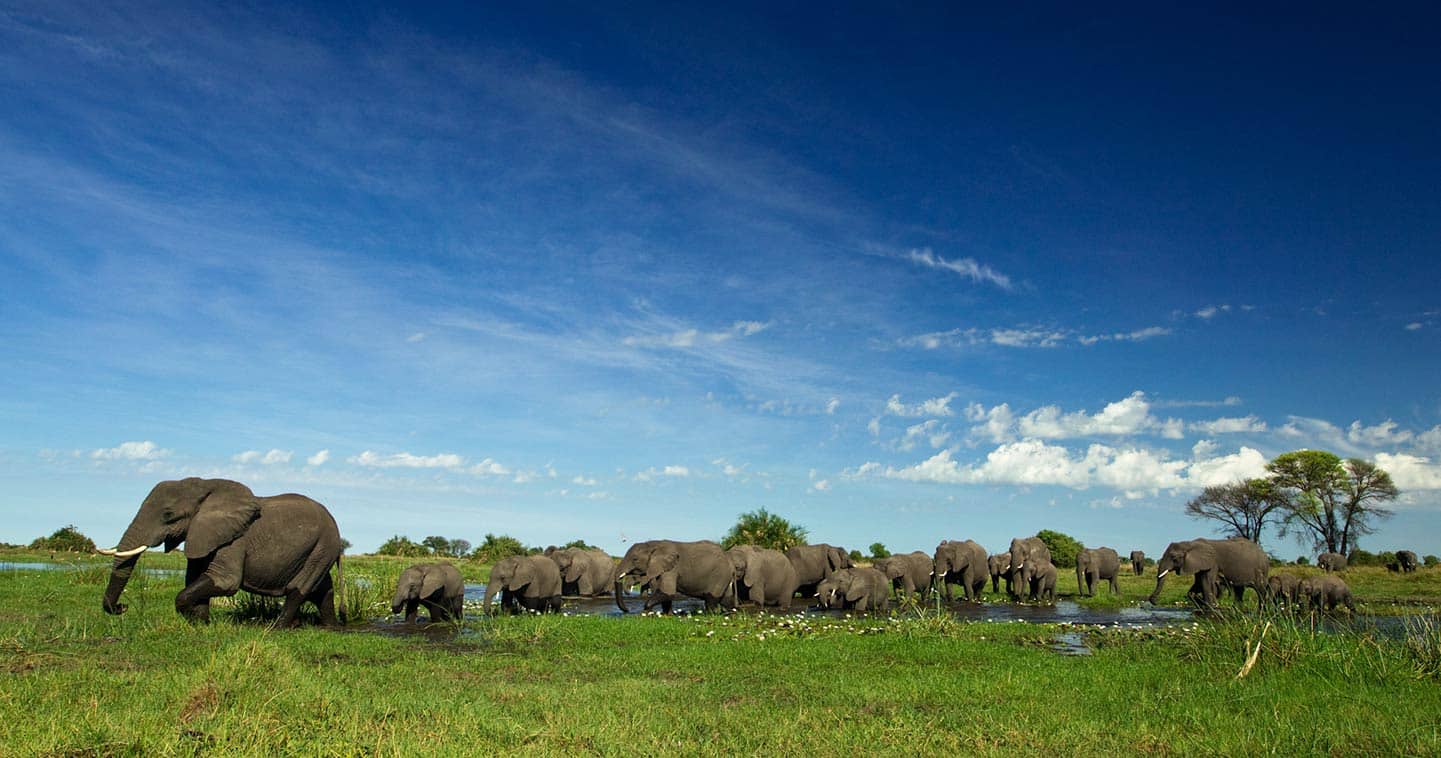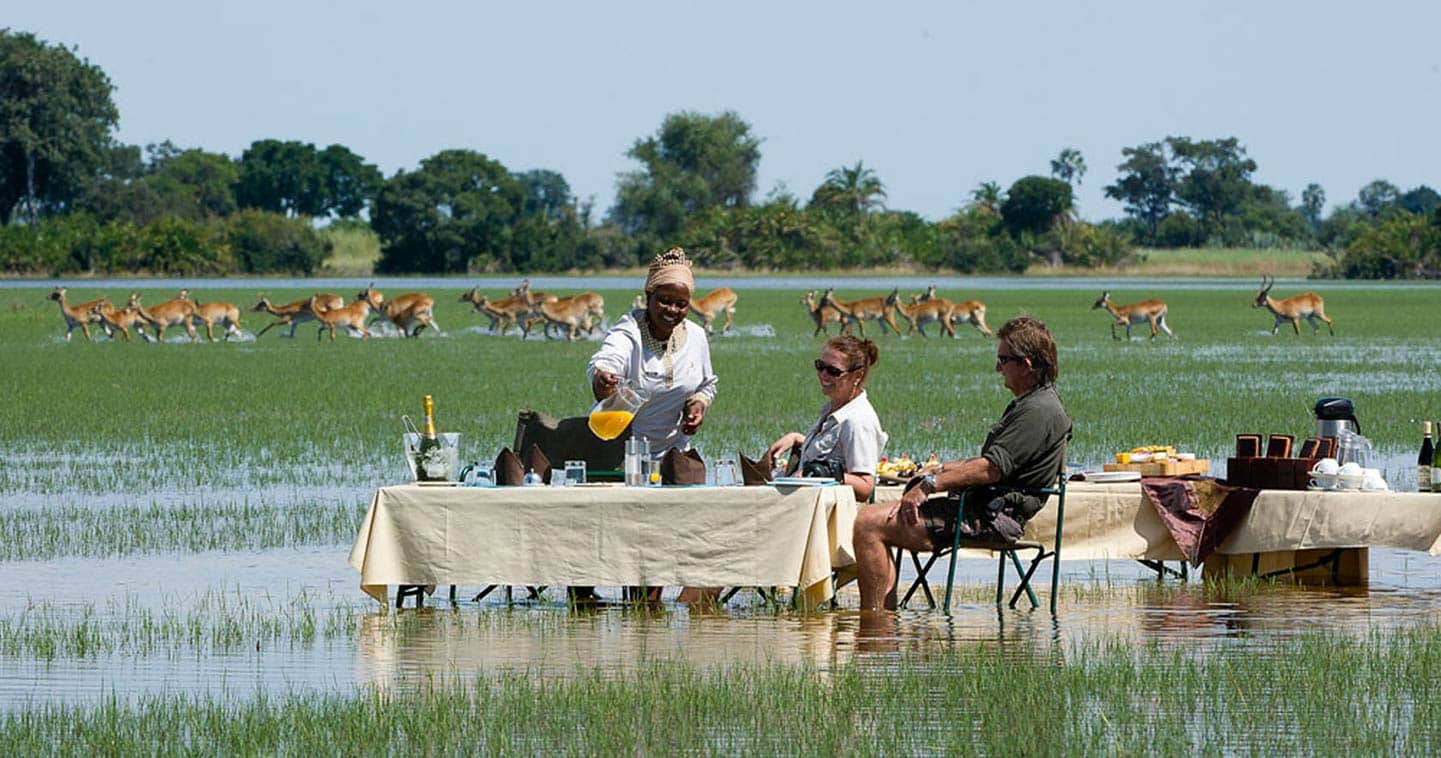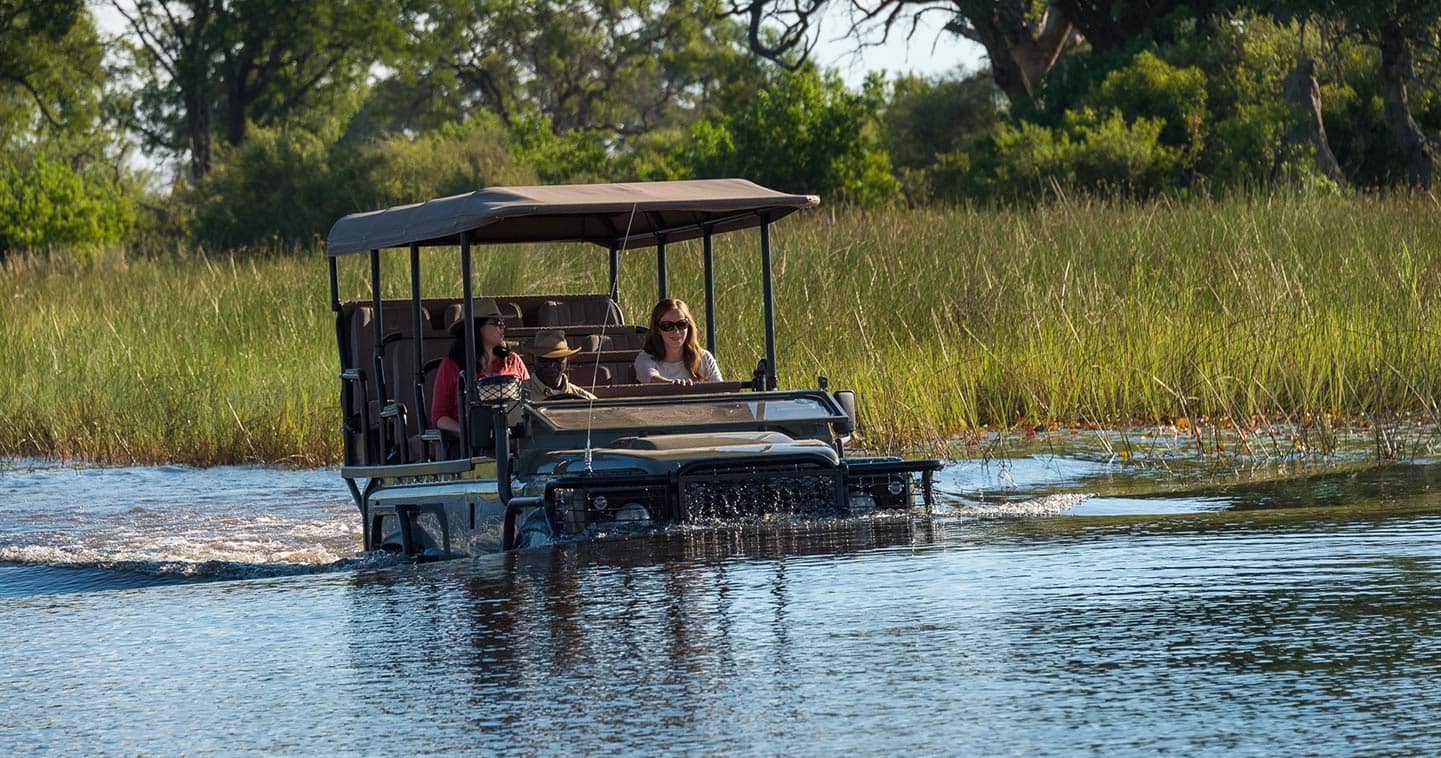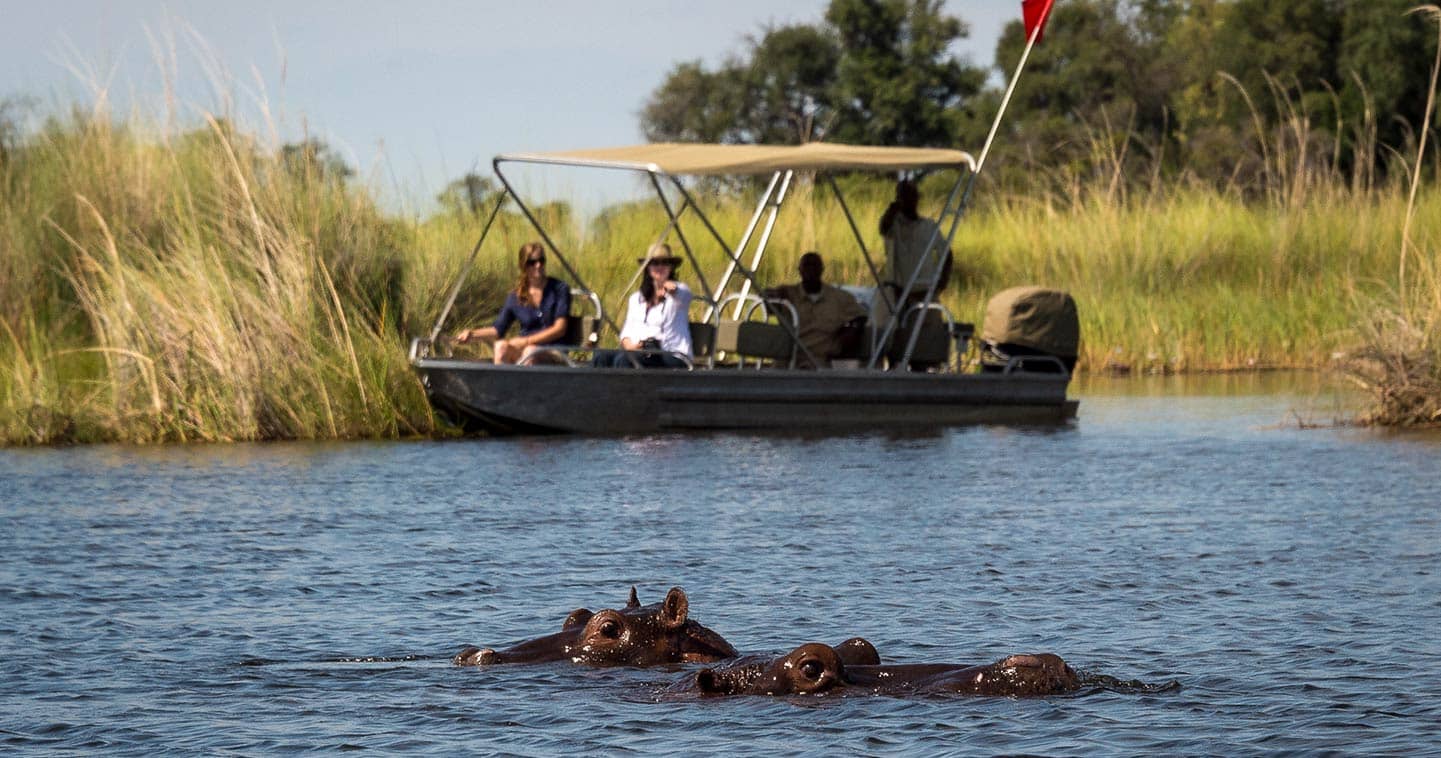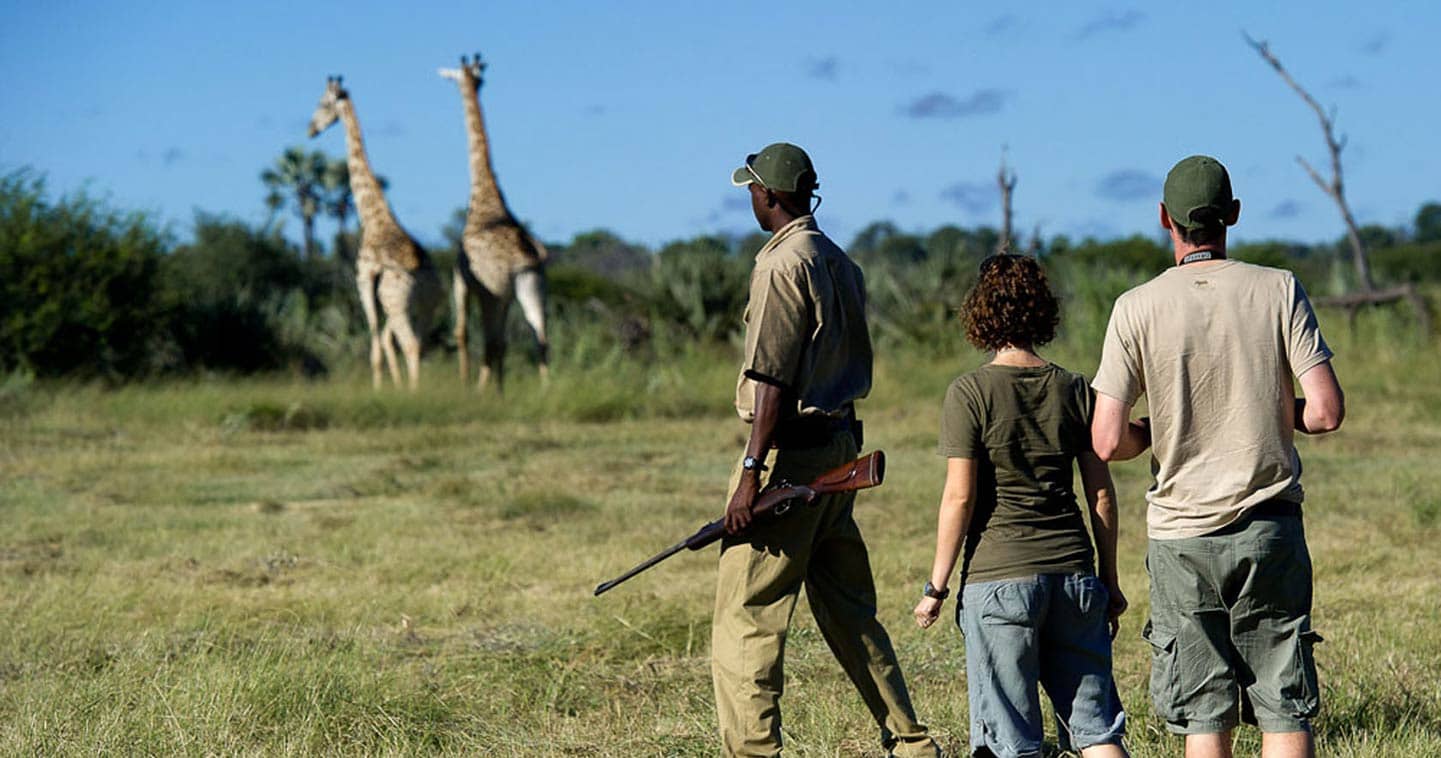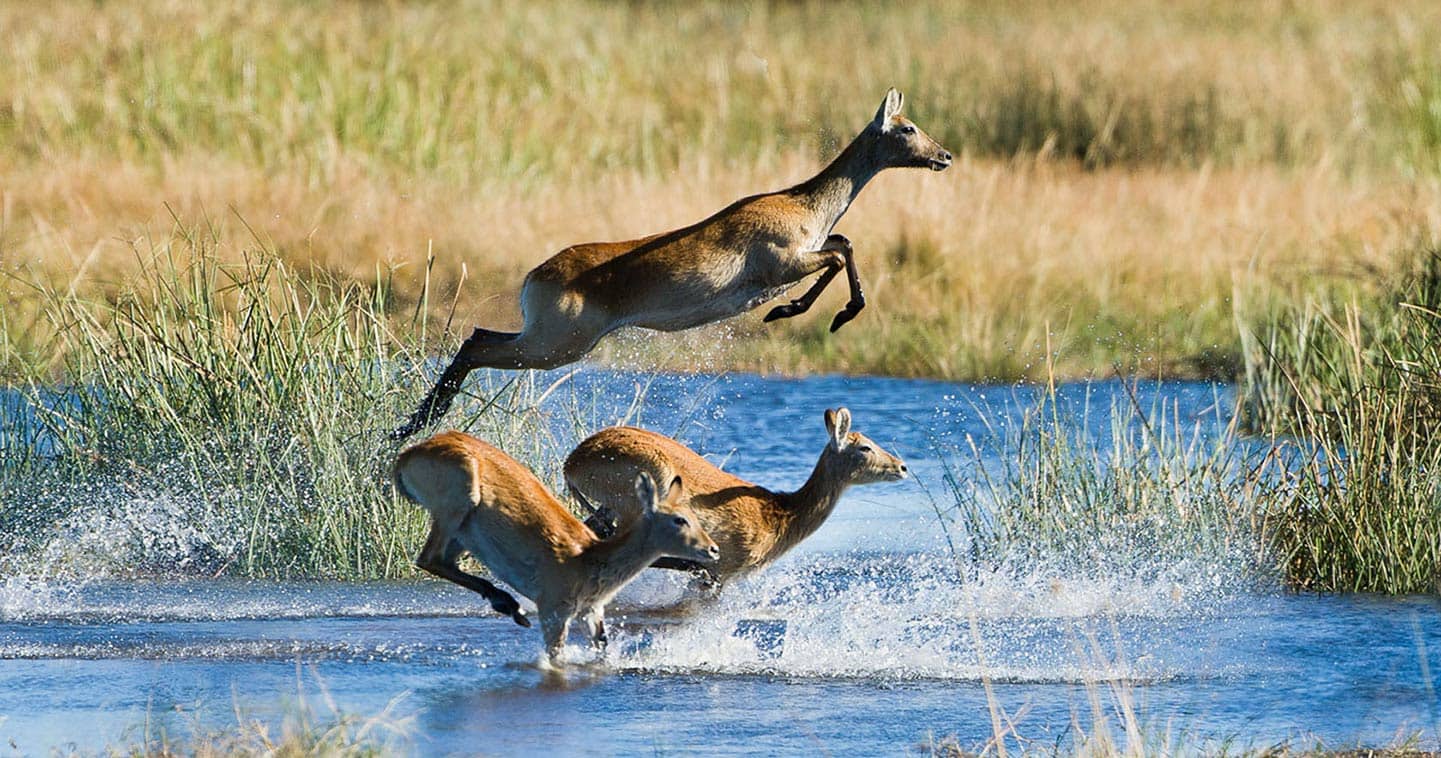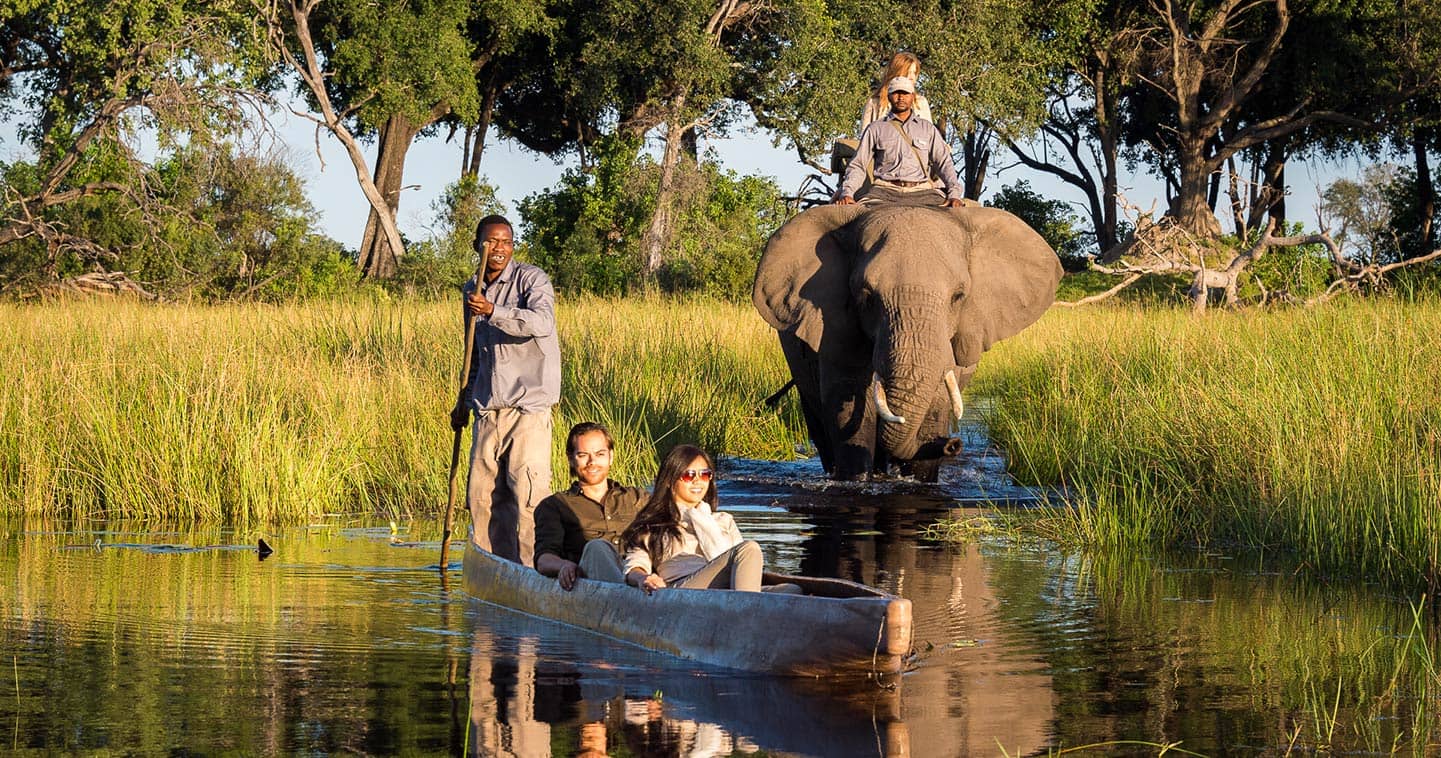Going on safari in the Okavango Delta
Safari Okavango Delta Botswana information
You might have a ton of questions racing through your mind; what should I bring on a safari in the delta? Do I need special clothing? Rain suits? A life jacket? We happily provide you with some general information, although it will always depend on how you are traveling and where you are going. If you are flying in for a short stay, you don’t need to pack too much. Do note that smaller chartered planes allow 10 to 12 kg for carry-on, packed in a soft bag.
A water paradise: boats, mokoro’s and fishing
One of the highlights of staying in the Okavango Delta is that safari activities may take place on the water (lodge and season dependent). A game drive is exciting for sure, as it gives you the opportunity to cover a larger area. However, there is nothing more relaxing than experiencing the Okavango tranquility in a traditional dug-out canoe (mokoro). Silently slip into the river and slide through this water wonderland. Your guide – an experienced poler – will explain things along the way, and in the meantime you can just sit back and take it all in.
Besides mokoro trips, lodges often offer motorized boating trips and fishing trips (catch and release). All anglers are welcome and no fishing experience is necessary. Catching the strong, beautiful Tiger Fish (that can reach up to 9 kilos) is definitely something you want to add to your bucket list. As if a safari trip isn’t thrilling enough already, these fishing trips will make for even more excitement – promised!
Game drives and bush walks in the Okavango Delta
During your stay you may also go on several game drives (season and lodge dependent). Finally witnessing a leopard slinking towards his prey, hippos exposing their pink bellies in a waterhole, or lions resting on their backs – paws aloft. But there is another way to discover even more: our accommodations frequently offer game walks during the day as well. Let us explain a little bit about both.
Okavango Delta game drives
During a game drive, you venture out in a specially adapted vehicle (mostly open top) to seek the big game species. Experienced, knowledgeable, and – very important - passionate rangers and trackers guide all game drives. Most have grown up in the area or have lived there for several years. The community and staff of the Okavango Delta share a genuine concern for the animals, the environment and surrounding local communities. Trackers and rangers love to share facts and tales about the land they cherish so much.
It’s all in the game
Your guide's deep understanding of wildlife and its behavior guarantees that all animals are treated with great respect and dignity. This understanding also helps them tracking animals and seeing details nobody else notices. That said, you are in a natural environment; one day you will spot more wildlife than other days.
The next step - bush walks in the Okavango Delta
Although the local wildlife has adapted to the presence of jeeps, during a game walk you can get even closer. Together with an experienced guide you may spot that gangly giraffe; and standing next to it is incredibly thrilling. All your senses are piqued as you hear the animals snorting, smell the soil, and feel the tall grass that crackles with every step. Don’t miss out on this enthralling safari experience. For safety reasons, most accommodations only allow children from fourteen years and older on a game walk.
A walking safari might sound a little frightening: walking unprotected between all the predators? We truly hope this doesn’t stop you from joining one; exploring on foot, without the noise of an engine, is often an almost meditative experience. All your senses are piqued as you hear animals snorting, smell the soil, and feel the tall grass crackling with every step. Your guide might be armed during the walk, but this isn’t allowed everywhere in the Okavango Delta. Guides are very experienced with animal behavior and will make sure you are always safe. There is one rule: listen closely to the guide’s instructions and follow up on them.
What does a typical Okavango safari day look like?
If this is your first safari trip (how exciting!), you might be curious what a safari day looks like. Although this can vary from camp to camp, there is generally a day-plan most lodges follow, simply because the rhythm of wildlife and weather conditions are changeable. And don’t be deterred by an early rise; there is plenty of time for napping later in the day. Do like the animals: siestas are for the hottest hours, between 12.00 and 15.00 o’clock.
05.30 hours: wake up call, 06.30 hours: after fresh coffee or hot tea and a morning snack, start of the morning safari activity (in the Delta this is typically a game drive or boat trip) 09.30 hours: extensive breakfast.
10.00 hours - 15.00 hours: time to relax and have lunch (some lodges offer guided safari walks after lunch).
15.00 hours: second game activity (again: either a drive, mokoro trip, motorized boat trip of fishing): 19.00 hours: back in the lodge for dinner; 21.00 hours: coffee, drinks, leisure time: 22.00 hours: time to rest, while you will dream about all the experiences you collected during the day. Sleep well!
Okavango Delta bush cuisine & drinks
Even though you are in the middle of the wilderness, there is no lack of fresh produce, homemade pastries, extensive buffets, richly flowing African wines, healthy salads and even pizzas (with your personally picked toppings). You will be pampered when it comes to food in our accommodations. All meals, as well as coffee and tea and (often) local brand drinks, are included in the price. Some lodges offer fishing and, if not restricted to catch and release, you can actually prepare your own fresh fish, straight from the clear Delta waters to your plate.
Without giving away all the surprises, meals are often offered at different locations (ever had a meal on a river bank while you hear hippos calling in the background?). The traditional boma-dinner, an open area with a big fire in the middle, is a must (if weather conditions permit) and comes with traditional singing and dancing performances.
If you have any dietary requirements, please inform your lodge accordingly; the chefs are more than happy to oblige.
This is what you pack for the Okavango Delta
Thankfully, you don’t need a new wardrobe and a bunch of equipment for a safari in the Okavango Delta. But there is some packing-advice that could come in handy.
- Bring some light fabrics and loose-fit clothing that dries quickly, in tranquil colours. (Laundry is offered daily in most camps, so don’t pack too much)
- Grab a warm sweater, scarf and hat. Temperatures plummet in mornings and evenings; warm clothes during a game drive in an open safari vehicle are a necessity.
- Wear clothing with long sleeves and trousers that cover your legs; this against mosquitos and plants during your game walk.
- Shorts for men and women are fine in the bush, but longer trousers are socially acceptable in rural villages
- It is accepted to dress casually in safari camps
- A squashable hat and sunglasses with good UV protection are essential
- Leave all your camouflage of military themed clothes at home: in Africa this is not considered appropriate clothing
- Wear lightweight footwear with ankle support if possible. Make sure the shoes are not brand new and feel comfortable
- Bring a few pair of thin socks
- A field guide is great fun to ‘study’ during leisure time and helps you understanding what you see right in front of you. An excellent field guide is "Watching wildlife: Southern Africa". A long established field guide for bird watchers is "Newman's Birds of Southern Africa". (Also very good to get the anticipation growing before you go).
Useful tools
Who goes on a safari without bringing tools? Here are a few items we always find useful.
- Your own binoculars (to view animals from your private deck and anywhere else)
- Your camera (of course!)
- A cheap waterproof watch (leave expensive jewelry at home)
- Sunblock and lipsalve
- A small pocket torch
- Insect repellent
- Camps often provide water bottles, but you can bring one yourself, too
Game in focus: safari photography
Snap a group of darting antelopes or zebras galloping away in a whirl of dust: we don’t need to explain that South Africa is a true paradise for nature photographers. We would like to provide you with some of our tips.
The best results are achieved by using a (digital) SLR camera with one or more lenses. For photography of wild animals a lens with a minimum range of 200 mm is crucial, preferably a 300 mm lens. For landscape photography, a wide-angle lens (18 mm or less) is recommended. Beautiful portraits can be taken with lenses with a fixed focal length (usually a 50 mm lens provides good results) and large aperture. Don't feel like carrying big bags of photo equipment on your South Africa safari? An 18-200 mm telezoom lens produces beautiful pictures, and pretty much all subjects are within range. Important during your Okavango Delta safari is protecting your valuable equipment: because you will probably also drive on unpaved roads, dust easily gets into your car and may damage your camera. Make sure a quality dust-free bag always protects your camera.
A few words on safari safety
Going on a safari is extremely thrilling and exciting, but comes with a few safety issues. Once you are in the lodge, listen carefully to the briefing provided by your ranger or accommodation staff. They always know what game is currently staying in the vicinity of the lodge. Many lodges are not fenced in; wildlife can freely enter the premises and will do so. For this reason it is not allowed to walk unaccompanied around the lodge after sunset. Would you like to go to the main building, restaurant or bar? Just call the reception and they will send someone to pick you up from your room.

